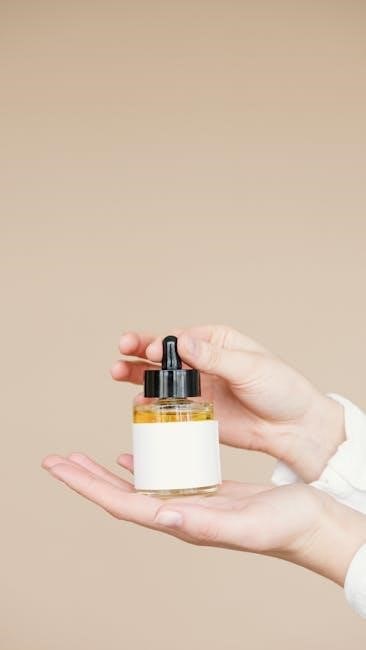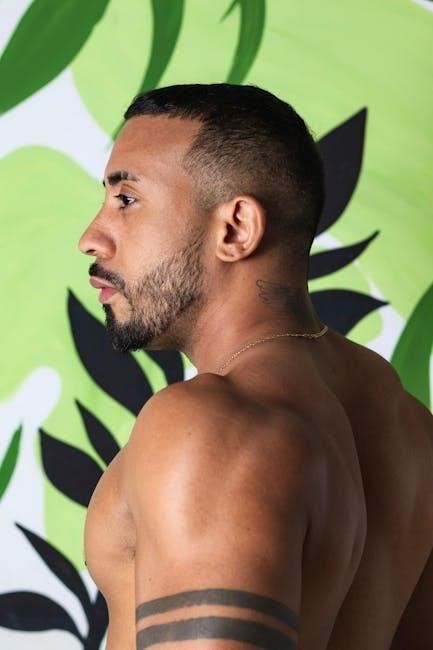Redefining self-love and body positivity, The Body Is Not an Apology movement challenges societal norms, embracing inclusivity and empowerment. It advocates for radical acceptance and self-love.
The Concept of Radical Self-Love
Redefining self-love as a form of political resistance, radical self-love empowers individuals to embrace their authentic selves, free from societal conditioning. It challenges systems of oppression by rejecting beauty standards and embracing diversity. This philosophy, championed by Sonya Renee Taylor, encourages unlearning shame and fostering inclusivity. Radical self-love is not just self-care but a radical act of defiance against a world that seeks to marginalize certain bodies. It advocates for liberation, encouraging individuals to reclaim their worth and reject external validation. By embracing radical self-love, people can dismantle internalized oppression and celebrate their uniqueness, fostering a culture of acceptance and empowerment. This movement is a powerful tool for personal and collective liberation, emphasizing that all bodies deserve respect and dignity. It is a call to action, urging individuals to challenge harmful narratives and embrace their true selves without apology. Through radical self-love, individuals can heal, grow, and contribute to a more inclusive and compassionate society. This concept is central to creating a world where everyone feels valued and empowered, regardless of their appearance or identity. By embracing radical self-love, individuals can break free from societal expectations and live authentically, fostering a culture of acceptance and inclusivity. This philosophy is a cornerstone of the body positivity movement, emphasizing self-acceptance and empowerment. It encourages individuals to reject harmful beauty standards and embrace their unique qualities, promoting a more inclusive and compassionate world. Radical self-love is a powerful tool for personal transformation and societal change, empowering individuals to live fully and unapologetically. It is a celebration of diversity and a rejection of systems that seek to marginalize and oppress. By embracing radical self-love, individuals can find liberation and contribute to a more just and equitable society. This concept is essential for fostering self-acceptance and challenging harmful narratives that perpetuate inequality. Radical self-love is a movement that transcends individual transformation, aiming to create a world where all bodies are respected and valued. It is a call to action, urging individuals to embrace their worth and reject societal expectations that seek to diminish their value. Through radical self-love, individuals can find empowerment, heal from past wounds, and contribute to a more inclusive and compassionate society. This philosophy is a powerful reminder that self-love is not selfish but a necessary act of resistance against a world that often seeks to erase or marginalize certain identities. Radical self-love is a journey of self-discovery, growth, and liberation, empowering individuals to live authentically and unapologetically. It is a celebration of diversity and a rejection of systems that perpetuate inequality and oppression. By embracing radical self-love, individuals can find the courage to challenge societal norms and create a more just and equitable world. This concept is central to the body positivity movement, emphasizing the importance of self-acceptance and empowerment. Radical self-love is not just a personal journey but a collective movement toward a more inclusive and compassionate society. It is a powerful tool for transformation, encouraging individuals to embrace their uniqueness and reject harmful narratives that perpetuate inequality. Through radical self-love, individuals can find liberation, heal from past wounds, and contribute to a world where all bodies are respected and valued. This philosophy is a call to action, urging individuals to embrace their worth and reject societal expectations that seek to diminish their value. Radical self-love is a celebration of diversity and a rejection of systems that seek to marginalize and oppress. It is a journey of self-discovery, growth, and liberation, empowering individuals to live authentically and unapologetically. By embracing radical self-love, individuals can find the courage to challenge societal norms and create a more just and equitable world. This concept is essential for fostering self-acceptance and challenging harmful narratives that perpetuate inequality. Radical self-love is a powerful movement that transcends individual transformation, aiming to create a world where all bodies are respected and valued. It is a call to action, urging individuals to embrace their worth and reject societal expectations that seek to diminish their value. Through radical self-love, individuals can find empowerment, heal from past wounds, and contribute to a more inclusive and compassionate society. This philosophy is a powerful reminder that self-love is not selfish but a necessary act of resistance against a world that often seeks to erase or marginalize certain identities. Radical self-love is a journey of self-discovery, growth, and liberation, empowering individuals to live authentically and unapologetically. It is a celebration of diversity and a rejection of systems that perpetuate inequality and oppression. By embracing radical self-love, individuals can find the courage to challenge societal norms and create a more just and equitable world.
Body Positivity and Its Importance in Modern Society
Body positivity is a transformative movement challenging societal beauty standards and fostering inclusivity; It emphasizes self-acceptance, rejecting harmful stereotypes that perpetuate shame and exclusion. In a world dominated by unrealistic beauty ideals, body positivity promotes mental health by encouraging individuals to embrace their natural forms. It addresses systemic discrimination faced by marginalized bodies, advocating for equality and representation. By challenging fatphobia, racism, and ableism, body positivity creates spaces for diverse voices. Its importance lies in empowering individuals to reclaim their narratives, fostering confidence and resilience. This movement is vital for building a society where all bodies are valued and respected, regardless of size, shape, or ability.
The Body Is Not an Apology: An Overview
The Body Is Not an Apology by Sonya Renee Taylor is a powerful movement advocating for radical self-love and body acceptance. It challenges societal norms, promoting inclusivity and empowerment for all bodies, and has become a global force for change, inspiring millions to embrace their true selves without shame.
Sonya Renee Taylor and Her Vision
Sonya Renee Taylor, a renowned activist, poet, and educator, founded The Body Is Not an Apology, a movement and digital platform dedicated to radical self-love and body acceptance. Her vision challenges societal norms by promoting inclusivity and empowerment, urging individuals to embrace their bodies without shame. Taylor’s work, which has reached millions globally, emphasizes unlearning body shame and fostering radical openness. As an award-winning performance poet and former national slam champion, she brings a powerful voice to the fight against body oppression, advocating for a world where all bodies are valued and respected equally.
The Book’s Core Message: Embracing All Bodies

The Body Is Not an Apology delivers a powerful message of radical self-love, urging readers to reject societal beauty standards and embrace their bodies unconditionally. The book challenges the notion that bodies must conform to narrow ideals, advocating instead for acceptance and love of all bodies, regardless of size, race, ability, gender, or age. By dismantling body shame and fostering self-worth, Taylor’s work empowers individuals to reclaim their narratives and live fully in their bodies. This transformative approach promotes inclusivity, resilience, and confidence, helping readers build a deeper connection with themselves and others. It’s a call to create a world where every body is valued and respected.

Key Principles of The Body Is Not an Apology
Sonya Renee Taylor’s work emphasizes radical openness, inclusivity, and dismantling body shame. It encourages self-reflection, acceptance, and empowerment, fostering a global movement toward body liberation and equity;
Unlearning Body Shame
Unlearning body shame involves dismantling societal beauty standards and embracing radical self-love. Sonya Renee Taylor’s work challenges readers to recognize and reject harmful narratives about their bodies. By addressing internalized oppression and systemic injustice, individuals can reclaim their worth. The process requires self-reflection, compassion, and acceptance. Taylor’s approach encourages readers to break free from shame and cultivate a deeper connection with their bodies. This journey fosters resilience and empowerment, allowing individuals to live authentically. The workbook provides practical exercises to aid in this transformation, helping readers move toward a life of radical acceptance and self-love.
Radical Openness and Acceptance
Rather than resisting change, radical openness encourages embracing new perspectives and feedback to foster growth. This practice, highlighted in The Body Is Not an Apology, involves being receptive to diverse experiences and ideas. Acceptance is key, allowing individuals to appreciate their bodies and others’ without judgment. By letting go of the need for control or perfection, people can cultivate compassion and understanding. Taylor’s approach emphasizes that radical openness is not about agreeing with everything but about being willing to learn and evolve. This mindset promotes inclusivity and creates a foundation for meaningful connections and personal transformation.
The Power of Inclusivity
Inclusivity is a cornerstone of The Body Is Not an Apology movement, championing the idea that all bodies deserve respect and dignity. Sonya Renee Taylor emphasizes that true inclusivity dismantles barriers, uniting diverse voices and experiences. By celebrating differences, the movement challenges societal beauty standards and fosters a culture of acceptance. Inclusivity not only empowers individuals but also creates a collective force for change, ensuring no one feels marginalized or excluded. This approach underscores the belief that radical self-love and body positivity are only possible when everyone is valued equally, leading to a more compassionate and equitable world.
The Impact of The Body Is Not an Apology Movement
The Body Is Not an Apology movement has sparked global conversations, fostering a community that celebrates diverse bodies and challenges systemic shame. Its transformative stories inspire empowerment and societal change, proving radical self-love can create a more inclusive world.
Global Reach and Community Building
The Body Is Not an Apology movement, founded by Sonya Renee Taylor, has gained global recognition, reaching over half a million people monthly through its digital platforms. Its inclusive message of radical self-love and body acceptance has created a vibrant, diverse community worldwide.
This movement fosters connection among individuals from all backgrounds, encouraging them to embrace their bodies and reject societal shame. By sharing transformative stories and resources, it has become a powerful force for empowerment, helping people build confidence and challenge harmful norms.
Transformative Stories and Testimonials
The Body Is Not an Apology movement is enriched by countless transformative stories from individuals who have embraced radical self-love. These testimonials highlight journeys of overcoming shame, healing, and empowerment, creating a ripple effect of acceptance worldwide.
By sharing their experiences, individuals inspire others to reject societal beauty standards and embrace their authentic selves. These stories foster a sense of community, proving that radical self-love is not just a concept but a lived reality for many. They remind us that every body deserves respect, dignity, and love, regardless of size, shape, or ability.
Practical Tools for Radical Self-Love
- Workbook exercises for self-reflection and healing.
- 10 tools like “Dump the Junk” to foster self-acceptance.
- Practices to unlearn body shame and embrace radical openness.
Workbook Exercises for Self-Reflection
The workbook companion to The Body Is Not an Apology offers practical exercises to guide readers in unlearning body shame and embracing radical self-love. These tools encourage introspection and empowerment, helping individuals reconnect with their bodies and challenge societal norms. Exercises like “Dump the Junk” prompt readers to release negative beliefs and cultivate self-acceptance. By fostering radical openness, the workbook provides a safe space for healing and growth, inviting readers to embrace their unique identities and move toward a more inclusive and compassionate understanding of themselves and others. These exercises are designed to be transformative and accessible for all.
10 Tools for Radical Self-Love
Sonya Renee Taylor’s 10 Tools for Radical Self-Love provide a transformative framework for embracing body positivity and self-acceptance. These tools, designed to dismantle shame and foster empowerment, include practices like “Dump the Junk,” which encourages releasing negative beliefs about oneself. Other tools focus on radical openness, self-compassion, and reclaiming one’s body as a source of joy. By integrating these tools into daily life, individuals can cultivate a deeper connection with their bodies and challenge societal beauty standards. These practical strategies empower readers to embrace their uniqueness and live authentically, fostering a culture of inclusivity and love. They are essential for anyone seeking personal liberation and healing.

Personal Journeys and Empowerment
Personal journeys of radical self-love involve overcoming shame and embracing one’s identity. This empowerment fosters intimacy with the body, celebrating its uniqueness and strength. Through self-reflection and acceptance, individuals reclaim their worth, moving beyond societal expectations to live authentically and unapologetically.
Overcoming Shame and Embracing Identity
Sonya Renee Taylor’s work emphasizes unlearning body shame and embracing identity. By challenging societal norms, individuals can dismantle internalized negativity and reclaim their bodies as sources of strength. Radical openness encourages self-acceptance, fostering a deeper connection with one’s true self. This journey involves recognizing and rejecting harmful narratives, replacing them with affirmations of worth. Overcoming shame liberates individuals to live authentically, celebrating their unique identities; Taylor’s approach empowers people to move beyond fear and judgment, embracing their bodies without apology. This transformative process fosters resilience, self-love, and a profound sense of belonging to oneself.
Building Intimacy with Your Body
Building intimacy with your body involves fostering a deeper, compassionate connection with your physical self. This process requires radical openness and acceptance, allowing you to embrace your body’s uniqueness without judgment. By prioritizing self-care and mindfulness, you can heal past wounds and nurture a loving relationship with your body. Sonya Renee Taylor’s teachings encourage reclaiming your body as a source of strength and joy, rather than shame. Through practices like journaling, affirmations, and physical care, you can cultivate intimacy and redefine what it means to truly inhabit your body with love and respect.

The Future of Radical Self-Love
The future of radical self-love lies in fostering cultural shifts toward body acceptance and inclusivity. Education and advocacy will play crucial roles in creating a world that values diversity and promotes self-love for all.
Cultural Shifts Toward Body Acceptance
The Body Is Not an Apology movement is driving a cultural shift by challenging societal beauty standards and fostering inclusivity. It emphasizes that all bodies, regardless of size, color, or ability, deserve respect and love. Media representation is evolving, with more diverse voices and images being celebrated. Education plays a key role in dismantling stereotypes and promoting acceptance. Advocacy efforts are encouraging people to embrace their uniqueness and reject harmful norms. This shift is creating a more compassionate world where diversity is cherished, and everyone feels valued. The future holds promise for a society that truly works for everyone.
The Role of Education and Advocacy
The Body Is Not an Apology highlights the importance of education and advocacy in dismantling systemic oppression and body shame. By teaching individuals to recognize and challenge harmful beauty standards, education becomes a powerful tool for liberation. Advocacy efforts amplify marginalized voices, promoting inclusivity and equity. Sonya Renee Taylor’s work emphasizes the need for policies and practices that honor diverse bodies. Through workshops, digital platforms, and community-building, the movement fosters a culture of acceptance. Education and advocacy are key to creating a world where everyone feels valued and empowered, free from societal constraints. This collective effort is transforming lives globally.
A World That Works for Everyone
The Body Is Not an Apology empowers individuals to embrace radical self-love, fostering a world where everyone feels valued and empowered, free from societal constraints.
